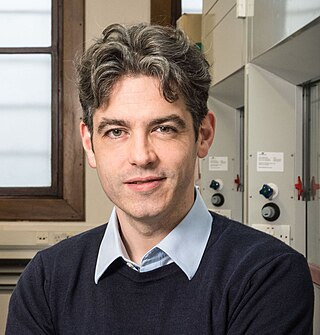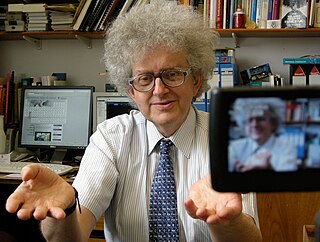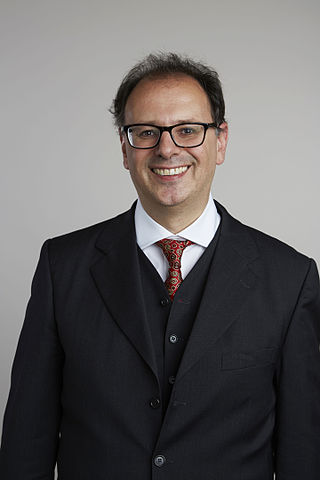Vernon Charles Gibson is a British scientist who served as Chief Scientific Adviser at the Ministry of Defence between 2012 and 2016. He was reappointed to the MoD CSA role in May 2023. He is visiting professor at Imperial College London and the University of Oxford, Honorary Professor at the University of Manchester. He delivered the Royal United Services Institute (RUSI) Prince Philip Lecture on Military Education in Nov 2023.

Malcolm Leslie Hodder Green was Professor of Inorganic Chemistry at the University of Oxford. He made many contributions to organometallic chemistry.

Leroy "Lee" CroninFRSE FRSC is the Regius Chair of Chemistry in the School of Chemistry at the University of Glasgow. He was elected to the Fellowship of the Royal Society of Edinburgh, the Royal Society of Chemistry, and appointed to the Regius Chair of Chemistry in 2013. He was previously the Gardiner Chair, appointed April 2009. His feature Profile in RSC Chemistry World “Searching for Complexity” explains his vision for the future of digital chemistry.

Sir Martyn Poliakoff, is a British chemist, working on fundamental chemistry, and on developing environmentally acceptable processes and materials. The core themes of his work are supercritical fluids, infrared spectroscopy and lasers. He is a research professor in chemistry at the University of Nottingham. As well as carrying out research at the University of Nottingham, he is a lecturer, teaching a number of modules including green chemistry.
The School of Chemistry is a school of the University of Edinburgh, in Scotland. In the 2008 Research Assessment Exercise (RAE) the school was ranked sixth in the UK.
Dame Lynn Faith Gladden is the Shell Professor of Chemical Engineering at the University of Cambridge. She served as Pro-vice-chancellor for research from 2010 to 2016.

Sir Anthony Kevin Cheetham is a British materials scientist. From 2012 to 2017 he was Vice-President and Treasurer of the Royal Society.

Dame Clare Philomena Grey is Geoffrey Moorhouse Gibson Professor in the Department of Chemistry at the University of Cambridge and a Fellow of Pembroke College, Cambridge. Grey uses nuclear magnetic resonance spectroscopy to study and optimize batteries.

Polly Louise Arnold is director of the chemical sciences division at Lawrence Berkeley National Laboratory and professor of chemistry at the University of California, Berkeley. She previously held the Crum Brown chair in the School of Chemistry, University of Edinburgh from 2007 to 2019 and an Engineering and Physical Sciences Research Council (EPSRC) career fellowship.

James Henderson Naismith is a Scottish Professor of Structural Biology at the University of Oxford, former Director of the Research Complex at Harwell and Director of the Rosalind Franklin Institute. He previously served as Bishop Wardlaw Professor of Chemical Biology at the University of St Andrews. He was a member of Council of the Royal Society (2021-2022). He is currently the Vice-Chair of Council of the European X-ray Free Electron Laser and Vice-President (non-clinical) of The Academy of Medical Sciences. It has been announced that he will be the Head of the MPLS division at Oxford in the autumn of 2023.
The John B. Goodenough Award is run biennially by the Royal Society of Chemistry and awards contributions to the field of materials chemistry. The prize winner, chosen by the Materials Chemistry Division Awards Committee, receives a monetary reward, a medal, a certificate and completes a UK lecture tour.

Ali Alavi FRS is a professor of theoretical chemistry in the Department of Chemistry at the University of Cambridge and a Director of the Max Planck Institute for Solid State Research in Stuttgart.

David Parker is an English chemist, Chair Professor at Hong Kong Baptist University, and Emeritus Professor at the University of Durham.

William I. F. David is a professor of Materials Chemistry in the Department of Chemistry at the University of Oxford, an STFC Senior Fellow at the ISIS neutron source at the Rutherford Appleton Laboratory and a Fellow of St Catherine's College, Oxford.

Russell Edward Morris is a British chemist and Bishop Wardlaw Professor of Chemistry at the University of St Andrews since 2016. He played first-class cricket while he was a student at the University of Oxford, and also represented the university in association football playing in Varsity matches at various venues, including Wembley Stadium and Highbury.

Paul O'Brien was professor of Inorganic Materials at the University of Manchester. where he served as head of the School of Chemistry from 2004 to 2009 and head of the School of Materials from 2011 to 2015. He died on 16 October 2018 at the age of 64.
Stephen Mann, FRS, FRSC, is Professor of Chemistry, co-director of the Max Planck Bristol Centre for Minimal Biology, director of the Centre for Organized Matter Chemistry, director of the Centre for Protolife Research, and was principal of the Bristol Centre for Functional Nanomaterials at the University of Bristol, UK.

Sarah (Sally) Lois Price is Professor of Physical Chemistry at University College London.
Rachel O'Reilly is a British chemist and Professor at the University of Birmingham. She works at the interface of biology and materials, creating polymers that can mimic natural nanomaterials such as viruses and cells. She is a Fellow of the Royal Society of Chemistry and of the Royal Society.
Anthony Roy West FRSE, FRSC, FInstP, FIMMM is a British chemist and materials scientist, and Professor of Electroceramics and Solid State Chemistry at the Department of Materials Science and Engineering at the University of Sheffield.













